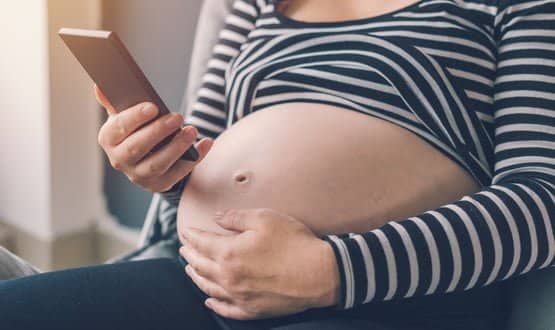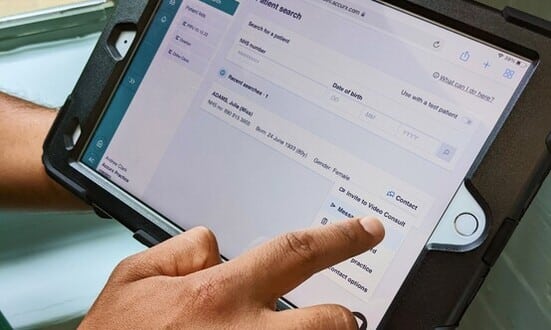Now is the time for digital tech to be embedded in maternity care
- 21 April 2020

For expectant mothers and their partners, the coronavirus pandemic can be an especially worrying time. Dr Lucy Mackillop, a consultant obstetric physician at Oxford University Hospitals NHS Foundation Trust and chief medical officer of Sensyne Health, explores why digital tools can help.
At hospitals around the country, normal service has been interrupted. Operations have been postponed, routine outpatient clinic appointments have been cancelled, and patients are being urged to stay away if at all possible. It’s the correct response; after all, we all want to facilitate social distancing and do whatever we can do to minimise the pressure on the NHS right now.
But there is at least one group who cannot stay away; their bodies are ticking clocks. Pregnant women, wherever they are in their journey, still require a minimum safe level of check-ups and tests. As a consultant obstetric physician, I know all too well the importance of ensuring we are still able to provide care for women 24/7; to be there for women concerned about their baby; to be able to check everything is ok; and of course, care for women giving birth.
It’s right that pregnant women are considered by the Government as a vulnerable group, asked to take extra caution during this pandemic and be particularly stringent in following social distancing measures. In reality, pregnant women have enormous physical strength but are working hard to support and grow another human being. Particularly during the last third of pregnancy, women may be more vulnerable to infection and are more likely to have severe symptoms. We learnt this the hard way during the H1N1 pandemic.
Life on hold
For expectant mothers and their partners, now will be a worrying time as access to antenatal and postnatal services are modified, and in particular face-to-face appointments are postponed because of the huge NHS coronavirus effort. This is for three reasons: Firstly, to protect women from close contact with other patients and healthcare staff to reduce the chances of infection; Secondly, to help protect staff from infection so they can continue to do their job; and thirdly to allow staff to be redirected to other areas and services of the hospital as required.
To some extent, pregnant women can take control of their wellbeing by keeping themselves safe; avoiding contact with others, following all the existing advice around eating healthily and staying hydrated, and, importantly, ensuring they do regular exercise.
Staying flexible with tech
However maternity services can also contribute by being flexible in ways to deliver some services without women having to come into hospital. This can be achieved by integrating technology into the regular care they are offering women. The Royal College of Midwives reports 78% of staff say routine face-to-face antenatal and postnatal appointments have ended, emphasizing the need for alternatives models of care.
Even before this crisis, many maternity services were doing just that, from simple innovations like housing patient information on dedicated apps to remind women of when their next appointment was or shared test information, to tools to monitor the pregnancy and signal when a woman should contact her midwife. Video consultations, already in use by GPs across the country, are becoming more common and should be taken advantage of wherever possible.
Getting appy
There are also a number of apps supported by the NHS to answer the questions of pregnant women or monitor their health, for example the Kicks Count app, which can be used to keep track of the baby’s movements in the womb and signpost any changes.
The GDm-Health system is a digital therapeutic application which I and colleagues at University of Oxford and Oxford University Hospitals NHS Foundation Trust developed a few years ago with the clinical AI company Sensyne Health.
Profound change
This crisis will profoundly change the way healthcare is delivered in UK. There is a real opportunity to make this more efficient through remote management whenever possible. Ultimately, this could even lead to improved care in some circumstances, due to more accurate real-time monitoring; and of course, it will also have positive effects on the environment.
The NHS is showing just how extraordinary a service it is with its reaction to the coronavirus crisis. Pregnant women should know that this remains a priority area of care — and that there is real help available to keep them and their babies’ healthy outside hospital while they are self-isolating.
Now is the time for all areas of the NHS to scale the already significant progress towards embedding digital technologies into routine clinical care.
During the Covid-1 pandemic, Sensyne Health is offering GDm-Health, which allows pregnant women to monitor their diabetes remotely, to NHS Trusts across the country for free.





1 Comments
This is absolutely right. The system they have got in Poole Hospital is brilliant and works for high blood pressure in pregnancy. The app tells the patient what to do. Has saved loads of time and money.
Comments are closed.